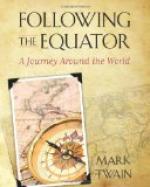Forty-five years ago the site now occupied by the City of Ballarat was a sylvan solitude as quiet as Eden and as lovely. Nobody had ever heard of it. On the 25th of August, 1851, the first great gold-strike made in Australia was made here. The wandering prospectors who made it scraped up two pounds and a half of gold the first day-worth $600. A few days later the place was a hive—a town. The news of the strike spread everywhere in a sort of instantaneous way—spread like a flash to the very ends of the earth. A celebrity so prompt and so universal has hardly been paralleled in history, perhaps. It was as if the name Ballarat had suddenly been written on the sky, where all the world could read it at once.
The smaller discoveries made in the colony of New South Wales three months before had already started emigrants toward Australia; they had been coming as a stream, but they came as a flood, now. A hundred thousand people poured into Melbourne from England and other countries in a single month, and flocked away to the mines. The crews of the ships that brought them flocked with them; the clerks in the government offices followed; so did the cooks, the maids, the coachmen, the butlers, and the other domestic servants; so did the carpenters, the smiths, the plumbers, the painters, the reporters, the editors, the lawyers, the clients, the barkeepers, the bummers, the blacklegs, the thieves, the loose women, the grocers, the butchers, the bakers, the doctors, the druggists, the nurses; so did the police; even officials of high and hitherto envied place threw up their positions and joined the procession. This roaring avalanche swept out of Melbourne and left it desolate, Sunday-like, paralyzed, everything at a stand-still, the ships lying idle at anchor, all signs of life departed, all sounds stilled save the rasping of the cloud-shadows as they scraped across the vacant streets.
That grassy and leafy paradise at Ballarat was soon ripped open, and lacerated and scarified and gutted, in the feverish search for its hidden riches. There is nothing like surface-mining to snatch the graces and beauties and benignities out of a paradise, and make an odious and repulsive spectacle of it.
What fortunes were made! Immigrants got rich while the ship unloaded and reloaded—and went back home for good in the same cabin they had come out in! Not all of them. Only some. I saw the others in Ballarat myself, forty-five years later—what were left of them by time and death and the disposition to rove. They were young and gay, then; they are patriarchal and grave, now; and they do not get excited any more. They talk of the Past. They live in it. Their life is a dream, a retrospection.
Ballarat was a great region for “nuggets.” No such nuggets were found in California as Ballarat produced. In fact, the Ballarat region has yielded the largest ones known to history. Two of them weighed about 180 pounds each, and together were worth $90,000. They were offered to any poor person who would shoulder them and carry them away. Gold was so plentiful that it made people liberal like that.




